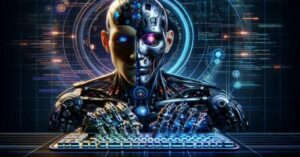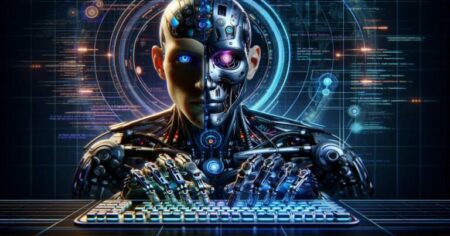The Current State of Technology and Humanity
As of 2023, the relationship between technology and humanity has become increasingly intricate, with notable advancements in various fields. Artificial intelligence (AI) has emerged as a transformative force, leading to the development of systems that can perform tasks previously reserved for human cognition. From natural language processing to image recognition, these innovations raise questions about the nature of intelligence itself and challenge the existing definitions of human capability. The integration of AI into everyday life has not only enhanced productivity but has also led to efficiencies in healthcare, finance, and other sectors.
Biotechnology represents another significant frontier where the lines between human and machine continue to blur. The advent of CRISPR and gene-editing technologies has allowed for unprecedented manipulation of biological systems. These advancements hold remarkable potential for curing genetic diseases, improving agricultural resilience, and even extending human lifespan. However, they also bring forth ethical dilemmas, such as the implications of “designer babies” and the socioeconomic disparities that may arise from unequal access to such technologies.
Automation further complicates the landscape, with robots and algorithms increasingly taking on roles traditionally filled by human workers. This shift has prompted substantial debate regarding employment disruptions and the future of work. While automation can lead to increased efficiency and reduced operational costs, it poses challenges, including potential job displacement and a widening skills gap among the workforce. As society adapts to these technological changes, the social fabric may undergo significant transformations, necessitating a reevaluation of education and workforce development strategies.
In considering these developments, it is essential to recognize both the benefits and challenges posed by the current state of technology. As we approach 2025, these ongoing advancements raise crucial questions about the extent to which technology will redefine what it means to be human, setting the stage for profound implications on ethics, employment, and society as a whole.
Predictions for Technology in 2025
As we approach the year 2025, technological advancements appear poised to create profound shifts across various sectors. One of the most anticipated innovations includes the next generation of artificial intelligence (AI). This evolution is expected to enhance machine learning capabilities significantly, enabling systems to make even more autonomous decisions. The implications for daily life may involve AI becoming increasingly integrated into personal and professional spheres, potentially managing everything from household devices to complex business operations.
Simultaneously, quantum computing is set to revolutionize the processing power available for certain tasks. With the ability to perform calculations at unprecedented speeds, quantum computers could solve problems currently deemed impossible for classical machines. This leap in technology will likely transform industries such as finance, supply chain management, and drug discovery, allowing for smarter predictions and optimized solutions.
Another notable development is the rise of augmented reality (AR). By 2025, AR technology is expected to transition from a niche application to a mainstream tool, enhancing educational methods and workplace efficiency. With its capacity to overlay digital information onto the physical world, AR might reshape how individuals interact with their surroundings, offering new ways to visualize data, engage in training exercises, and experience entertainment.
Furthermore, the integration of these technologies will have significant implications for healthcare. Enhanced AI can facilitate personalized medicine approaches, aiding in diagnostics by analyzing vast datasets more efficiently. Moreover, AR can be utilized in surgical training and procedures, allowing surgeons to visualize anatomy in real-time with greater precision.
In terms of environmental practices, innovative technologies will empower organizations to develop sustainable solutions. The fusion of AI and data analytics can lead to smarter energy management by predicting consumption patterns, thereby reducing waste and operational costs.
In conclusion, the next few years promise to deliver transformative advancements in technology. The convergence of AI, quantum computing, and augmented reality will redefine various aspects of daily life and society at large, potentially leading to significant breakthroughs in individual and collective experiences. As these technologies continue to evolve, their adaptability to meet changing needs will play a crucial role in shaping our future.
The Ethical and Societal Implications
As we anticipate the rapid advancements in technology by 2025, it is imperative to examine the ethical and societal implications these changes may bring. The digital age poses significant questions regarding privacy and surveillance, as personal data becomes increasingly commodified. Society must grapple with the extent to which individuals are willing to sacrifice their privacy for the conveniences offered by modern technology. The balance between security and individual rights is delicate, and misplaced trust in technological systems could lead to unprecedented invasions of privacy.
Furthermore, the ethics surrounding artificial intelligence (AI) looms large as we approach 2025. The development of AI systems capable of making decisions previously reserved for humans introduces a myriad of ethical dilemmas. Issues related to bias, accountability, and transparency in AI decision-making processes require careful examination. As these technologies integrate into everyday life, questions about the ethical use of AI in critical sectors such as healthcare, law enforcement, and employment must be addressed to prevent detrimental outcomes.
The evolving definition of personhood in a technologically advanced society also demands attention. As norms shift, the lines between human and machine blur. Technologies such as virtual reality, augmented reality, and advanced robotics challenge the traditional concepts of identity and community. This could lead to altered human relationships and engagement levels, possibly contributing to a more disconnected society despite the enhanced connectivity offered by technology.
Moreover, societal structures may transform as technology continues to intertwine with human identity. The implications on communal bonds become evident as interactions migrate to digital platforms. Individuals might find themselves navigating a landscape where meaningful connections become overshadowed by superficial online engagements. Thus, it is essential to consider how humanity can maintain its core values amidst these rapid technological changes, ensuring that the future aligns with a vision of society that promotes inclusivity, ethical standards, and genuine human connection.
Preparing for a Redefined Humanity
With the rapid advancement of technology, it is essential for individuals, organizations, and governments to take proactive measures in preparation for a redefined humanity by 2025. The landscape of work, communication, and education is evolving at an unprecedented pace, necessitating a robust approach to education and skill development. As traditional roles are increasingly automated, lifelong learning must become a cornerstone of personal and professional growth. Individuals should embrace continuous education by pursuing online courses, attending workshops, and engaging in peer-led learning experiences that foster relevant skills applicable to a technologically advanced society.
Moreover, fostering adaptability is crucial in an era characterized by rapid changes and unpredictability. Individuals and organizations alike must cultivate a mindset that is resilient and open to change, which can be achieved through participation in diverse experiences and interdisciplinary collaborations. This approach not only enhances problem-solving abilities but also promotes innovative thinking, which will be essential in navigating the challenges posed by emerging technologies. Organizations can facilitate this adaptability by fostering a culture of flexibility and encouraging employees to explore new ideas and methodologies.
The role of public policy in shaping a future in which technology benefits humanity cannot be overstated. Governments must prioritize creating frameworks that ensure equitable access to technological innovations and protect the rights of individuals. This encompasses implementing regulations that discourage monopolistic practices, supporting initiatives that bridge the digital divide, and investing in public awareness campaigns about the implications of technological changes. By prioritizing inclusive public policies, the focus can shift towards leveraging technology as a tool for enhancing collective well-being.
As we anticipate the transformative power of technology, it is vital for individuals to reflect on their relationship with technology. Engaging with technology responsibly, understanding its impact, and advocating for ethical advancements are steps that everyone can take to ensure that the future of humanity remains in harmonious balance with technological progress.







